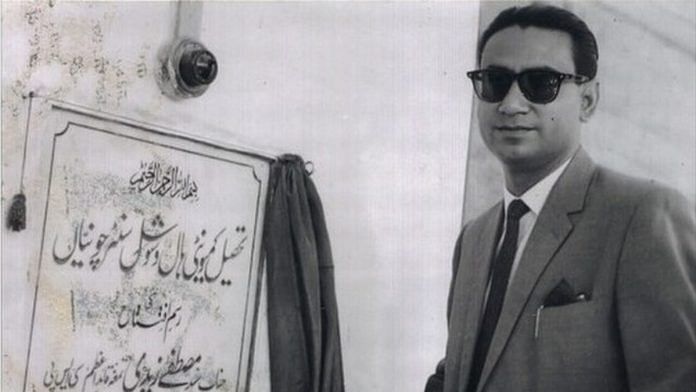New Delhi: Move over Only Murders in the Building and The Indian Predator: Butcher of Delhi—Pakistan is latching onto the ‘true crime’ trend with Notes on a Scandal, a limited podcast series that “re-examines and investigates a fascinating crime in an unusual city.”
After initially making waves in a limited run of eight episodes from December 2021 to April 2022, the women behind this podcast, Karachi-based Tooba Masood and Netherlands-based Saba Imtiaz have announced a second season, expected to release on all major podcast streaming platforms this August.
A companion piece to the duo’s as-yet-unreleased book Society Girl, Notes on a Scandal focuses on Pakistani Urdu poet and government officer Syed Mustafa Zaidi, who passed away in 1970 under mysterious circumstances and was the subject of a nationwide scandalous media circus.
The curious case of Mustafa Zaidi
Masood and Imtiaz aren’t the first figures to delve into this case in recent years. Author Kamran Asdar Ali previously provided an in-depth perspective on Zaidi’s turbulent life and career in an opinion article for Dawn in 2014.
“Zaidi was deputy secretary basic democracies posted in Lahore when, in December of 1969, under martial law regulations during Gen Yahya Khan’s regime, he was suspended from his duties; in May of 1970 he was removed from service. Zaidi was among the 303 civil servants who were dismissed from service on various charges during this era, the cases famously called “three naught three (303). Zaidi maintained his innocence about his dismissal and in his writings, alleged that he was made a scapegoat, as he was not willing to take a bribe from the relatives of a politically powerful person,” Ali wrote.
In a similar vein, Masood and Imtiaz addressed questions over the choice of their subject at the end of the initial run’s first episode itself, which was released in December 2021.
“Well, the reason we’re talking about Mustafa Zaidi after 50 years…is that we’re trying to solve the mystery of how Mustafa Zaidi ended up from a really well-known civil servant to disgraced civil servant accused of corruption…to someone who has to restart their career somehow as a writer and poet and moves to Karachi, to someone who ends up on 13 October 1970, to being watched on by friends as his body is taken out of his house, with a mysterious figure still left in the house unconscious,” Imtiaz explains.
The podcast’s progression is typical of the genre, with the co-hosts lifting the lid on gripping details of the case and exploring evidence by way of casual conversation set to ominous, suspenseful music. In a sense, they expand and follow up on the research conducted by Kamran Asdar Ali in a medium more in tune with current trends.
By the third episode itself, the real focus of the series shifts from Zaidi to a woman named Shahnaz Gul—and Zaidi’s extramarital relationship with her—as she became the target of Pakistani media after being found at his residence post his death.
Also read: Shehbaz govt squeezing perks of Pakistani diplomats. ‘Running kitchen abroad becomes tough’
A commentary on Pakistani society, media
As such, after exploring the circumstances and context surrounding his passing and whether it was a suicide or murder, Masood and Imtiaz centre the second season on The State vs. Shahnaz Gul, given both the media and court trial Gul had to face at the time.
The upcoming second season of journalists Saba Imtiaz and Tooba Masood's podcast will reexamine the trial of Shahnaz Gul.
More on Images – https://t.co/xKe511sY2g#Notesonascandal #MustafaZaidi #ShahnazGul #Podcast #truecrime pic.twitter.com/qH7wZB5Xbk
— Images (@dawn_images) July 29, 2022
“The idea behind the podcast was simple: the life and death of Mustafa Zaidi. This covered the late poet’s life, Shahnaz Gul, Karachi and Pakistani society in the ‘70s, the representation of women — everything,” Masood revealed in an interview with Dawn journalist Marsha Tayyab, labelling the case as “Pakistan’s first ever sex scandal”.
In the same interview, Imtiaz further added how she believes Notes on a Scandal is tapping into a nascent ‘market for podcasts’ on true crime and cold cases in Pakistan, citing her experience as a journalist.
The creators’ view on the representation of women in 1970s Pakistan is similar to the conclusions made eight years earlier by Ali, particularly on the impact of the media. “More than the tragic incident itself, the news reporting focused on voyeuristic techniques to depict an upper-class way of life that was fascinating in its details and the press milked the story for all its scandalous elements. In doing this, it also generated a moralising discourse about middle-class respectable behaviour that was implicitly contrasted with the lifestyle of the rich and the famous,” Ali wrote.
(Edited by Zoya Bhatti)



